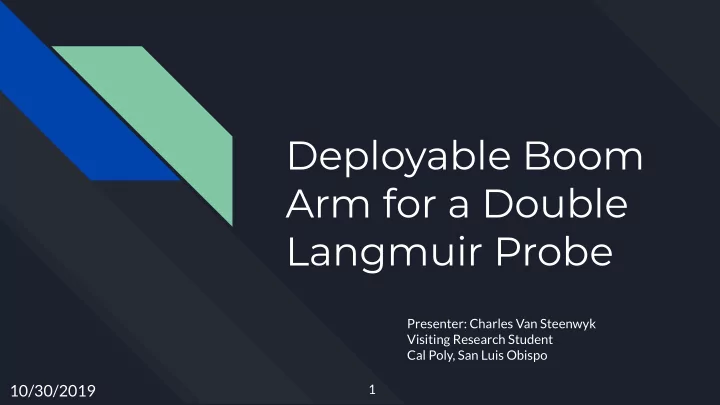

Deployable Boom Arm for a Double Langmuir Probe Presenter: Charles Van Steenwyk Visiting Research Student Cal Poly, San Luis Obispo 10/30/2019 1
Table of Contents 1. Introduction 2. Langmuir Probe Considerations 3. Goals 4. Deployment Mechanism 5. Potential Options 6. Current Design 7. Analysis 8. Results So Far 9. Next Steps 10/30/2019 2
Intro - Langmuir Probes Conducting element inserted into ● plasma Probe biased with respect to ● ground (of spacecraft) Bias varied to collect different ● data Image credit: David Pace 10/30/2019 3
Double Langmuir Probes Uses two probes to avoid charging ● issues One probe set relative to the other ● probe Spacecraft state of charge does not ● affect results Image credit: M.Y. Naz 10/30/2019 4
Project Goal Goals: Design and simulate a deployer arm for a DLP for BIRDS-V ● Ensure that the deployer meets all requirements for launch, ● volume, and science Deliverables: CAD model of deployer assembly ● 3-Views of deployer assembly ● Simulation results ● (If time permits) prototype model ● 10/30/2019 5
Environment considerations In order to avoid interference from the ● spacecraft, the probe must sit outside the CubeSat’s wake. This value is around 10cm ● Image credit: H.M. Elhaj/KyuTech Probe must deploy at least 10cm outside spacecraft 10/30/2019 6
Baselined Langmuir Probe Must be >1 Debye length ● Worst case Debye length: >30mm ● Planar design chosen over spherical due to ● volume constraints Probe will be 40mm diameter 10/30/2019 7
Baselined Langmuir Probe Deployer: Spring-loaded hinge mechanism on 137mm ● +Z face Boom connects to second hinge on ● -Z face Burnwire with Nylon fishing line to ● fix the assembly during launch Aluminium body acts as conductor ● Must attach to PCB and not metal ● structure 10/30/2019 8
Baselined Langmuir Probe Deployer (cont.): Second hinge on -Z face orients ● probe PTFE/electrically insulating channel ● guides arm/supports 2 axes Burn wire circuit through PCB ● 10/30/2019 9
Other Langmuir Probe Deployers: Tape dispenser: High stowed volume (need to ● remove boards) Scissor boom: High stowed volume ● Image credit: NASA/DLR Large area footprint (need to ● remove solar cells) 10/30/2019 10 Image credit: DICE / USU
Baseline Design Must not damage solar cells, impact structure, etc ● Goal of minimizing changes to current ● design/layout Avoid new board layouts ○ Avoid new structural design ○ 10/30/2019 11
Simulation and Test Random Vibration Test: start ● with NASA GEVS at component level, tested to JEMs for Structure + Boom Shock: HII-A User’s Guide ● Quasi-Static Loading from JEMs ● Natural frequency analysis ● Image credit: JAXA 10/30/2019 12
Results Mode No. Frequency(Hz) 1 579 2 785 3 1090 4 1540 5 2120 First mode > 100 Hz 10/30/2019 13
Results (cont.) Resultant loading: ● 25N at ~800Hz ○ Tie down cable may take that load ● Must have strength > 25N for ● Safety Factor > 1 Nylon fishing line with ○ tensile strength >100N is readily available From NASA GEVS profile ● (14.1Grms) 10/30/2019 14
Results (cont. 2) Requirement Result Deploy probes >10cm 110mm Direct probes into velocity direction Yes (second hinge mechanism) Conform to JEMs Payload Volume Yes (1mm clearance) Requirements Conform to JEMs Random Yes (no part failure, boom does not Vibrations Requirements damage other parts) Minimize hardware changes from Requires drilling into +Z, -Z structure and BIRDS-IV Printed Circuit Boards (PCBs) No change to +/-X, +/-Y faces 10/30/2019 15
Future Work: Update configuration Run shock test for launch profile Order materials Test burn wire, vibrations Document tests, design 10/30/2019 16
Travel to California 10/30/2019 17
Travel to California 10/30/2019 18
Travel to California 10/30/2019 19
Travel to California 10/30/2019 20
Travel in California 5.89m 2m 3.78m 10/30/2019 21
Thank you! Any questions? 10/30/2019 22
Backup 10/30/2019 23
Backup NASA GEVS: 14.1 Grms ● Not necessarily for ISS ● missions 10/30/2019 24
Backup 10/30/2019 25
Backup Mode 2: 785 Hz Expected simple beam frequency: 560 Hz 10/30/2019 26
Backup Mode 3: 1090 Hz Expected simple beam frequency: 870 Hz 10/30/2019 27
Recommend
More recommend